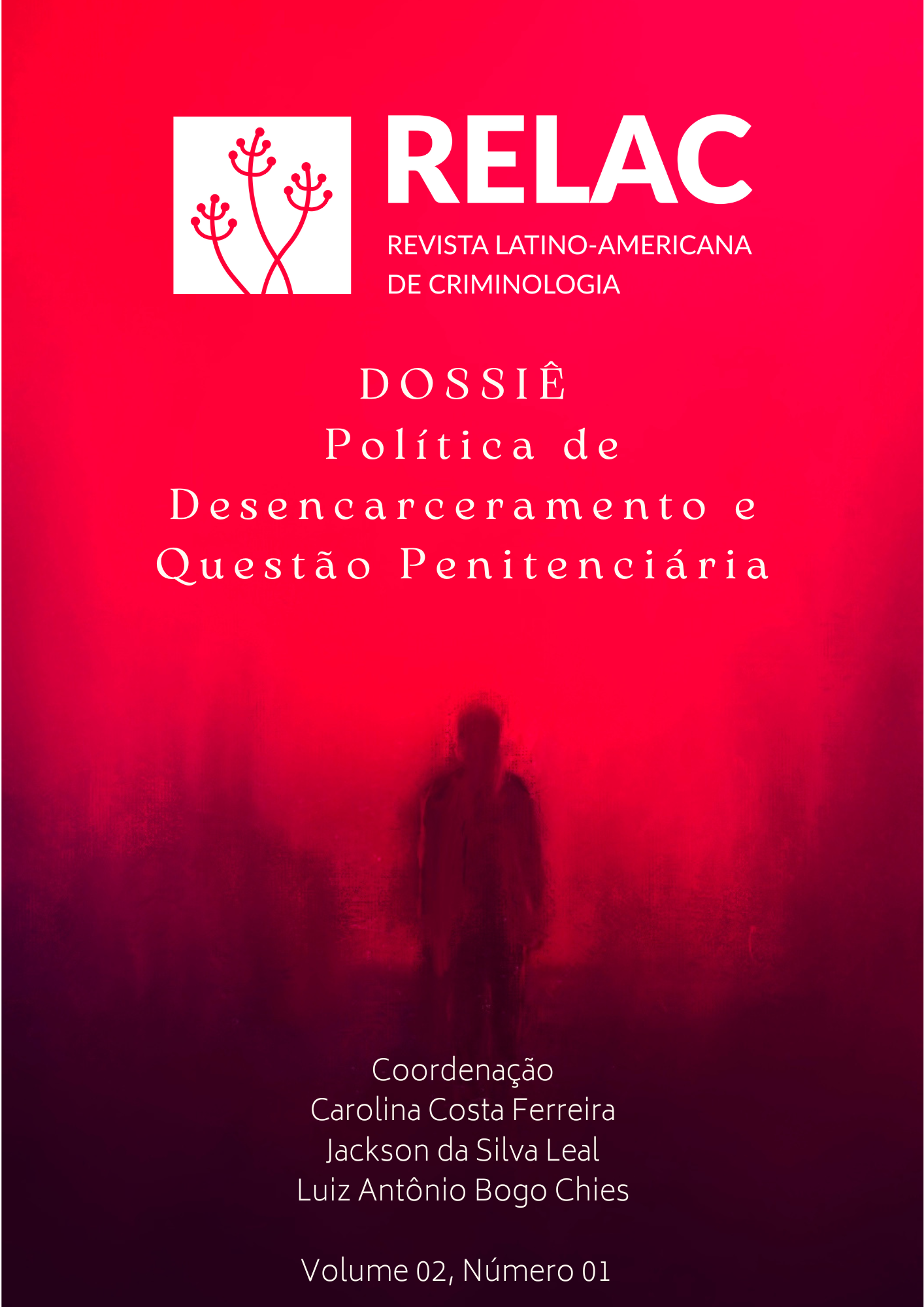House arrest as a mechanism of Brazil discharging policy
a study based on resolution 19/PR-TJMG/2020 by the Court of Justice of Minas Gerais in times of COVID-19
Keywords:
Overcrowded, House Arrest, Expansion, Covid-19Abstract
The present study aims to carry out a survey of the legislation, doctrine and jurisprudence that support the granting of house arrest in the current situation of the national and mining prison system, according to data from the Anuário de Segurança Pública and INFOPEN. From there, to analyze whether house arrest is a mechanism that consists of a satisfactory alternative to guaranteeing a more humane, dignified and able to achieve its purposes and a viable tool, legally and empirically, of a brazilian extrication policy, in the light of the experience lived in the State of Minas Gerais in the COVID-19 contingency policy adopted by the Court of Justice of Minas Gerais. and its results. Finally, it will perceive the need to expand the institute of house arrest and its viability as a measure to face the overcrowding of prisons, without disregarding the challenges that may be faced.
Downloads
References
BARATTA, Alessandro. Criminologia e crítica do Direito Penal. 3. ed. Rio de Janeiro: Revan, 2002.
BRASIL. Código de processo penal (1941): Decreto-lei n. 3.689, de 3-10-1941.
BRASIL. CONSELHO NACIONAL DE JUSTIÇA. O sistema prisional brasileiro fora da Constituição - 5 anos depois. 2021.
BRASIL. Lei de execução penal (1984): Lei n. 7.210, de 11-07-1984.
BRASIL. MINISTÉRIO DA JUSTIÇA. Departamento Penitenciário Nacional. Levantamento Nacional de Informações Penitenciárias. 2019.
BRASIL. MINISTÉRIO DA JUSTIÇA. Anuário de Segurança Pública. 2022
BRASIL. TRIBUNAL DE JUSTIÇA DE MINAS GERAIS. Resolução Conjunta SEDS/TJMG/MPMG/DPMG/PMMG/PCMG/OAB-MG nº 205/2016
BRASIL. TRIBUNAL DE JUSTIÇA DE MINAS GERAIS. Portaria Conjunta nº 834/2019. Publicada em 02 de maio de 2019.
BRASIL. TRIBUNAL DE JUSTIÇA DE MINAS GERAIS. Portaria Conjunta nº 19/PR-TJMG/2020.
BRASIL. FORUM BRASILEIRO DE SEGURANÇA PÚBLICA. Monitor da violência. São Paulo, 2021.
CAPEZ, Fernando. Curso de processo penal. 21. ed. – São Paulo: Saraiva, 2014.
MARCÃO, Renato. Curso de execução Penal. 9. ed. São Paulo: Saraiva, 2011.
MARCÃO, Renato. Prisão domiciliar substitutiva da preventiva: a Lei n. 13.257/2016 e o atual art. 318, incisos IV, V e VI, do CPP. Disponível em https://www.apmp.com.br/artigos/5714/. Acesso em 02.01.2018.
MIRABETE, Júlio Fabbrini. Execução penal: comentários à Lei 7.210, de 11-07-84. 10. ed. – São Paulo: Atlas, 2002.
NICOLITT, André Luiz. Manual de Processo Penal. 5. ed. – São Paulo: Editora Revista dos Tribunais, 2014.
NICOLITT, André Luiz. Processo penal cautelar: prisão e demais medidas cautelares. 2. Ed. – São Paulo: Editora Revista dos Tribunais, 2015.
MESSA, Ana Flávia. Curso de direito processual penal. 2. ed. São Paulo: Saraiva, 2014.
NUCCI, Guilherme de Souza. Manual de Processo Penal e Execução Penal. 13 ed. rev., atual. e ampl. – Rio de Janeiro: Forense, 2016.
OLIVEIRA, Eugênio Pacelli de. Curso de processo penal. 18. ed. – São Paulo: Atlas, 2014.
OLIVEIRA, Eugênio Pacelli de. Comentários ao código de processo penal e sua jurisprudência. 4. ed. – São Paulo: Atlas, 2012.
PACELLI, Eugênio. Manual de direito penal: parte geral/ Eugênio Pacelli, André Callegari – São Paulo: Atlas, 2015.
RANGEL, Paulo. Direito processual penal. 20. ed. – São Paulo: Atlas, 2012.
REALE, Miguel. Filosofia do direito. São Paulo: Saraiva, 1990.
ROCHA, Fernando A. N. Galvão da. Política Criminal. 2. ed. Belo Horizonte: Mandamentos, 2002.
TOURINHO FILHO, Fernando da Costa Tourinho. Manual de processo penal. 16. Ed. rev. e atual. – São Paulo: Saraiva, 2013.
Downloads
Published
How to Cite
Issue
Section
License
Copyright (c) 2022 Lara Ramos da Silva

This work is licensed under a Creative Commons Attribution-NonCommercial 4.0 International License.








